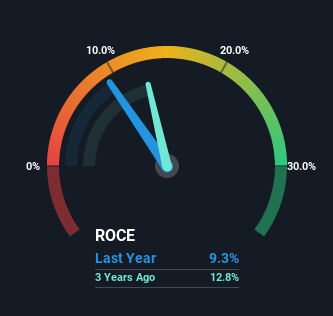- India
- /
- Metals and Mining
- /
- NSEI:JSWSTEEL
JSW Steel (NSE:JSWSTEEL) May Have Issues Allocating Its Capital

Finding a business that has the potential to grow substantially is not easy, but it is possible if we look at a few key financial metrics. One common approach is to try and find a company with returns on capital employed (ROCE) that are increasing, in conjunction with a growing amount of capital employed. Put simply, these types of businesses are compounding machines, meaning they are continually reinvesting their earnings at ever-higher rates of return. Having said that, from a first glance at JSW Steel (NSE:JSWSTEEL) we aren't jumping out of our chairs at how returns are trending, but let's have a deeper look.
What Is Return On Capital Employed (ROCE)?
For those who don't know, ROCE is a measure of a company's yearly pre-tax profit (its return), relative to the capital employed in the business. To calculate this metric for JSW Steel, this is the formula:
Return on Capital Employed = Earnings Before Interest and Tax (EBIT) ÷ (Total Assets - Current Liabilities)
0.093 = ₹131b ÷ (₹2.0t - ₹548b) (Based on the trailing twelve months to December 2022).
Thus, JSW Steel has an ROCE of 9.3%. In absolute terms, that's a low return and it also under-performs the Metals and Mining industry average of 15%.
Check out our latest analysis for JSW Steel

Above you can see how the current ROCE for JSW Steel compares to its prior returns on capital, but there's only so much you can tell from the past. If you'd like to see what analysts are forecasting going forward, you should check out our free report for JSW Steel.
What Does the ROCE Trend For JSW Steel Tell Us?
On the surface, the trend of ROCE at JSW Steel doesn't inspire confidence. To be more specific, ROCE has fallen from 17% over the last five years. Although, given both revenue and the amount of assets employed in the business have increased, it could suggest the company is investing in growth, and the extra capital has led to a short-term reduction in ROCE. And if the increased capital generates additional returns, the business, and thus shareholders, will benefit in the long run.
In Conclusion...
While returns have fallen for JSW Steel in recent times, we're encouraged to see that sales are growing and that the business is reinvesting in its operations. And long term investors must be optimistic going forward because the stock has returned a huge 144% to shareholders in the last five years. So while investors seem to be recognizing these promising trends, we would look further into this stock to make sure the other metrics justify the positive view.
If you'd like to know more about JSW Steel, we've spotted 3 warning signs, and 1 of them is significant.
If you want to search for solid companies with great earnings, check out this free list of companies with good balance sheets and impressive returns on equity.
New: Manage All Your Stock Portfolios in One Place
We've created the ultimate portfolio companion for stock investors, and it's free.
• Connect an unlimited number of Portfolios and see your total in one currency
• Be alerted to new Warning Signs or Risks via email or mobile
• Track the Fair Value of your stocks
Have feedback on this article? Concerned about the content? Get in touch with us directly. Alternatively, email editorial-team (at) simplywallst.com.
This article by Simply Wall St is general in nature. We provide commentary based on historical data and analyst forecasts only using an unbiased methodology and our articles are not intended to be financial advice. It does not constitute a recommendation to buy or sell any stock, and does not take account of your objectives, or your financial situation. We aim to bring you long-term focused analysis driven by fundamental data. Note that our analysis may not factor in the latest price-sensitive company announcements or qualitative material. Simply Wall St has no position in any stocks mentioned.
About NSEI:JSWSTEEL
JSW Steel
Engages in the manufacture and sale of iron and steel products in India and internationally.
Reasonable growth potential and fair value.

